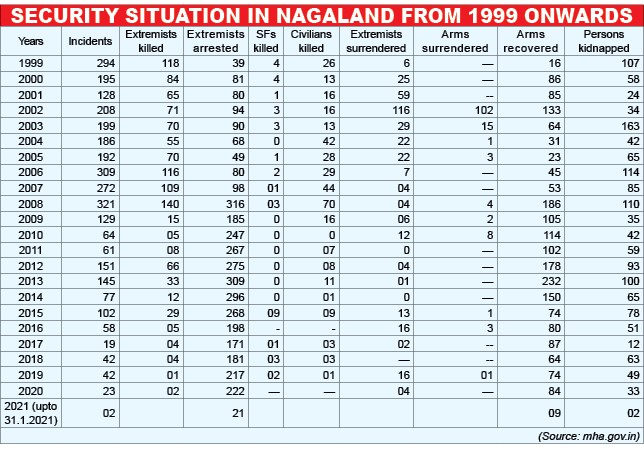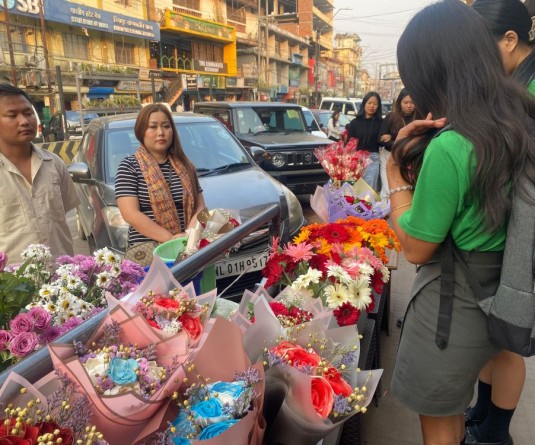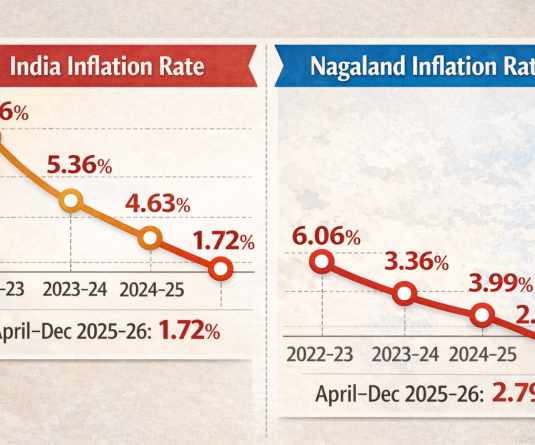
Imkong Walling
Dimapur | July 23
There has been a perceptible decline in armed clashes in Nagaland in recent years. To the residents of the state, it is felt in the form of a relatively relaxed atmosphere with reduced state military presence and gunfights with the exception of “extortion” and other law and order incidents.
The reduction in violence has been palpable. As per the latest MHA data (as on January 1, 2021), with 19 recorded incidents, 2017, to date, is the year when Nagaland reported the lowest number of incidents related to the Indo-Naga conflict since 1999. There was a two-fold increase in 2018 and 2019 but dropped by almost 50 percent in 2020 as compared to 2019. (See table for year-wise figures)
Further, a decadal drop of 71 percent has been observed. From 2497 recorded incidents in between 1999-2010, it dropped to 720 in between 2011-2020.
Kidnappings has also reduced significantly, while, not a single security forces casualty was reported in 2004, 2009, 2010, 2011, 2013, 2014, 2016 and 2020. The years- 2016 and 2020 has the distinction of reporting not a single civilian or security forces casualty since 1999, as per the MHA data.
A Parliamentary Standing Committee on Home Affairs, in a report tabled in Parliament in July 2018, had also noted a marked improvement in the state’s security situation.
On the other hand, the perceived improvement in the security environment has not had a bearing on the state security apparatus’ perception of Nagaland as a “Disturbed Area.” The Armed Forces Special Powers Act (AFSPA) continues to be imposed with the latest extension occurring on June 30, 2021.
But why?
Why the enforcement of this controversial law in Nagaland is not reviewed or revoked remains an unanswered question, meanwhile, the pulse within, has been for repeal, irrespective.
Draconian nature of the AFSPA is ground enough for repeal, has been the opinion here.
Neingulo Krome, Secretary General of the Naga Peoples’ Movement for Human Rights (NPMHR) maintained that, from a human rights perspective, statistics about violence or lack thereof should not be a consideration for reviewing the AFSPA. “The Act is inhuman, anti-democratic, unconstitutional and should have no place in any civilised society,” he asserted.
Nevertheless, if one is to factor statistics alone, he said that reviewing and revoking the Act is long overdue as “Naga areas are far more peaceful in comparison to many other places.”
Queried what could be the reasons for prolonging the promulgation of the Act, he said that it is as much a psychological game providing a sense of security to the security forces “to perform their duties.”
He further said that there could be other agendas, which the “enforcers themselves” would know best.
Rosemary Dzüvichu, Advisor to the Naga Mothers’ Association (NMA), held that the Government of India and the Nagaland state government seems to favour extension of the AFSPA “for their own interests.”
“This is very discouraging because it gives a wrong connotation to the rest of the country that Nagas do not want peace, when in reality it indicates there is reluctance by both (GoI and Nagaland government) to bring an early resolution of the Naga Political issue,” she said.
“By their own interests,” she stated that it demonstrates insincerity on the part of the GoI to brining a solution and the state government wanting the status quo to “keep their positions.”
Asserting an imperative to withdraw the Act, she said, “Nagas want an end to war and deserve their right to peace and security. It is time both the Centre and State government prove their commitment to peace. Any accord signed while AFSPA is in force, will be seen as under duress.”
Social activist and former Nagaland Tribes Council Secretary, Theja Therieh termed the extension of the AFSPA as “uncalled for and double standard” policy when armed activities have subsided and peace talks are in process.
According to him, the state government has a crucial role to play. “The state government should gear up and take up its responsibility to provide security and maintain peace in the state so that intervention of Central forces is not warranted.”
He queried as to why the state cannot assert itself when, “The CM, in his assessment, finds the state peaceful and state law enforcement machineries are capable of maintaining its internal disturbance.”
Veil of Peace
Other observers feel that the semblance of peace is only outward with underlying dynamics at play as to warrant extension of the Act.
“It gets extended because the political conflict is not resolved. There is a peace process, yes. But they still bear arms,” was how an observer from the state security apparatus summed it up.
Another admitted to the reduction in armed clashes and data attesting so. However, he held that the ground reality is different, while citing extortion in the name of taxation by the Naga Political Groups as an example.
Stating that it has become a case of political affairs intertwined with business interests, he said, “The police would take up an extortion case, the trail would reach a wall when the police are confronted with people enjoying political immunity.”
He added, “Delhi knows the groups have arms. That in itself is an indicator why AFSPA still remains. Once it is removed, we will know the effect. The state law enforcement agency would be helpless.”





